|

Spring 2001 (9.1)
Pages
20-24
Signals of Change
TV Debates
Between Azeris and Armenians
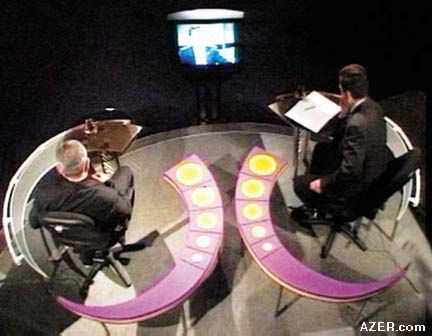
Photo: Taping of the TV program, Firing Line,
which aims to foster dialogue between Azerbaijanis and Armenians
about the Nagorno-Karabakh conflict. Inside the Azerbaijani studio
where Moderator Khayal Taghiyev (right) and guest view screen
with Armenian moderator Artyom Erkanian. The weekly program is
pre-taped and broadcast simultaneously in both Azerbaijan and
Armenia.
Back
in the 1980s when the Cold War was raging between the world's
two superpowers - the United States and the Soviet Union - an
experimental television program linked studio audiences via satellite
in both countries facilitating dialogue. Talk show hosts Phil
Donahue (U.S.) and Yuri Pozner (USSR) moderated the program.
The impact extended far beyond the two studio audiences as millions
of viewers in both countries began to see a human face on what
their own countries had portrayed as "the enemy". Consequently,
the program went a long way to ease tensions between two conflicting
powers.
The legacy of this daring experiment can still be felt today
in Azerbaijan and Armenia. The players have changed, but tensions
and distrust between the two countries, recently at war with
each other, is still high. The program called "Firing Line"
("Atash Khatti" in Azeri), is moderated by Khayal Taghiyev
and his counterpart in Armenia, Artyom Erkanian.
The program brings together experts - artists, politicians, economists
and others - from both sides to talk about issues related to
the Nagorno-Karabakh war. We asked Khayal to explain how the
program began and how it is fostering communication between the
two countries.
_____
The conflict that broke out in 1988 between neighboring Azerbaijan
and Armenia over Nagorno-Karabakh, a mountainous region inside
Azerbaijan of which the majority of the population is Armenian,
left thousands of military personnel as well as civilians dead.
A cease-fire was declared in May 1994, but the conflict is far
from over.
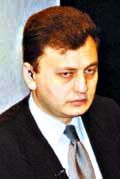  Left: Azerbaijani host Khayal Taghiyev. Photo:
Arzu Aghayeva. Left: Azerbaijani host Khayal Taghiyev. Photo:
Arzu Aghayeva.
Three
major issues have yet to be resolved: (1) the return of seven
districts located outside of Karabakh, which Armenians militarily
occupy, (2) the resettlement of nearly 1 million Azerbaijani
refugees back into these regions that are currently occupied
by Armenians, and (3) the status of Nagorno-Karabakh in relationship
to political rule.
Amidst this atmosphere of waiting and delays has come a breath
of fresh air - a TV program that links both sides in an ongoing
discussion. In each program, well-known experts from both countries
discuss issues related to Nagorno-Karabakh and the war. The program
is conducted in Russian, the language common to both countries,
which lived under Soviet domination from 1920 to 1991.
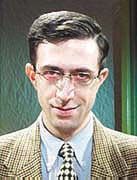  Left: Armenian host Artyom Erkanian. Left: Armenian host Artyom Erkanian.
In Azerbaijan, the program is broadcast by Azerbaijan News Service
(ANS), the Republic's most respected independent TV station;
in Armenia, it airs on Prometevs. Since its inception in October
2000, the show has aired simultaneously in both countries each
Thursday from 10-10:30 p.m. The program is pre-recorded in Mir
television studios in both Azerbaijan and Armenia. The funding
for the six-month, 24-program series comes from the U.S. government
via USAID, which funds Internews, the producer for the program.
Internews is an international non-profit organization that supports
open media worldwide. The company fosters independent media in
emerging democracies, produces innovative television and radio
programming and Internet content, and uses the media to reduce
conflict within and between countries.
According to a recent public opinion poll, the program had a
rating of 49 percent of ANS' potential viewers. "Personally,
I call the program 'Telebridge'," says Khayal Taghiyev,
Azeri host of the program. "But in my opinion, its official
name 'Firing Line' is exactly on target because at present, there
really is a firing line that is separating Azerbaijan and Armenia."
Even though the program is based upon a fairly simple concept,
it's the first show of its kind there. "As far as I know,
there have never been any TV programs like this in Azerbaijan,"
Khayal says. "There were several earlier attempts but all
were short-lived."
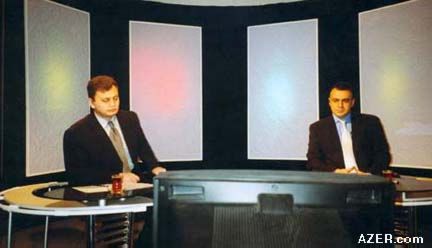
Photo: Azerbaijani Moderator
of Firing Line, Khayal Taghiyev (left), with Azerbaijani guest.
Photo: Arzu Aghayeva.
Khayal says that the public's reaction to the program has been
positive in both countries. You can overhear people discussing
the issues openly in public transport - in buses, taxis, the
Metro. "When we began this program, our goal was simply
to give people a chance to speak - to express their opinions.
As you can imagine, politicians are interested as well. They
want to know the opinions of the opposite side. Azerbaijani politicians
want to know what well-known Armenians are thinking and saying.
I've heard it's the same in Armenia."
Khayal's role is to help choose topics, select guests and moderate
the Azerbaijani side of the program. Guests must be fluent in
Russian and recognized as experts in their fields.
Tense Debate
Since Azerbaijan and Armenia have such a complicated relationship,
it's been difficult to reach a level of dialogue, especially
between the intellectuals and political elite from both sides.
No matter what topic is being discussed on the program, the two
sides usually start blaming and attacking each other. "I
doubt that we could find a single person in all of Azerbaijan
who would not be critical of the Armenian side," notes Khayal.
"How can I not be critical of Armenia?" he admits.
"These are the people who are occupying my country and have
forced hundreds of thousands of my fellow countrymen from their
homes and communities.
"Azerbaijan's viewpoint was shaped long ago," he continues.
"In Azerbaijan, people are convinced that Nagorno-Karabakh
is an integral part of our territory and that Armenia must give
us back the land that they are occupying. Such a position is
supported by four separate resolutions that were passed by the
United Nations in 1993 and 1994, which identify the Armenian
side as the aggressors in this war. The principle of 'territorial
integrity' was also supported by the OSCE (Organization for the
Security and Cooperation in Europe) at its Lisbon Summit in 1997.
The release of occupied territory is provided by international
law."
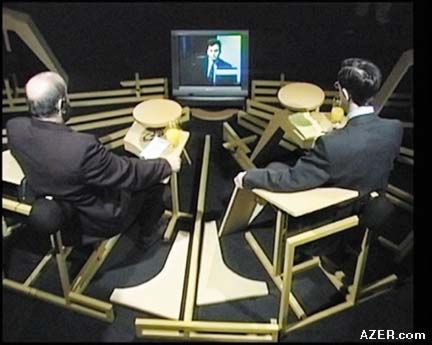
Photo:
Firing Line
Studio: inside the Armenian studio where Moderator Artyom Erkanian
(right) and guest view screen showing Azerbaijani moderator Khayal
Taghiyev.
Khayal describes how most program sessions develop. "Usually
our guests talk to each other on this level: 'Azerbaijan suffers
from this situation as a result of the war initiated by Armenia.
You are the side that started the war, you are the side that
thrust this war upon us.'
"But the Armenians counter by insisting that the people
living in Karabakh want to determine and rule themselves, and
that Azerbaijanis became aggressive toward them and organized
events like the 'pogroms' in Sumgayit. In my opinion, I think
that historical memory often impedes resolution on both sides."
Khayal admits that the hardest thing about moderating the program
is never knowing what to expect from his Armenian colleague.
"I never know ahead of time what the Armenian side is going
to say," Khayal confesses. "Sometimes they put me in
an awkward position. But I suppose there are times when I do
the same to them as well."
Even if the conversation flares up into an argument, nothing
is edited out. "From the beginning, the program organizers
decided not to cut anything, even though the program is pre-recorded
and aired later. The fact that it runs unedited creates a certain
tension that we like," he admits.
And yet, as long as both sides have the chance to speak to each
other, some form of dialogue is possible. "To tell you the
truth, before getting involved with this program, I thought it
was impossible for both sides to reach an agreement," Khayal
says. "I hope I'm not too courageous to think this way.
But I'm really convinced that it is possible to solve this conflict.
I hope this program will help convince people that the two sides
really can agree on certain principles.
"One thing that has emerged from our discussion is that
so far all of the guests have agreed that this problem must be
solved in a peaceful way," he continues. "It's just
that disagreements arise when we try to figure out how to do
that."
Controversial Topics
Each week "Firing Line" discusses a new topic related
to the war. They've discussed the negotiations process; compromises
that might be necessary to resolve the conflict; whether the
war might be rekindled and, if so, under what conditions; women
and conflict; the effects of the war on ecology; and even war
and cinema; social psychology, military personnel, transportation
and communications, and youth.
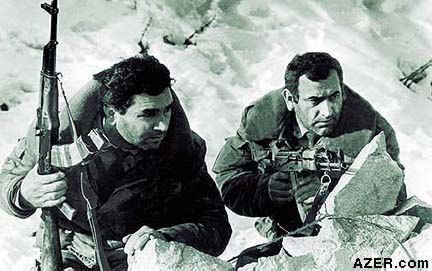 |
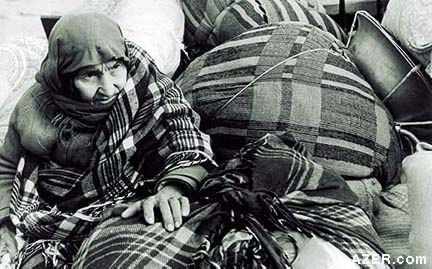 |
Photos: The conflict between
Azerbaijan and Armenia over Nagorno-Karabakh erupted in war in
1988 with a very tenuous cease-fire signed in 1994. The conflict
has left tens of thousands dead and about 1.2 million refugees
displaced from their homes in both Azerbaijan and Armenia.
The program that aired February 15, 2001, for instance, dealt
with "Economy and Conflict." Heydar Babayev, chairman
of the Azerbaijani State Securities Committee, debated former
Armenian Speaker of Parliament Khosrov Arutyunyan. They discussed
the possible benefits of reestablishing economic ties between
the two countries, and whether such an action would promote a
political settlement to the Nagorno-Karabakh conflict.
Babayev stated
that although economic ties could definitely benefit Armenia
- for the present, they were out of the question while nearly
20 percent of Azerbaijan's territory remained under Armenian
occupation. Arutyunyan insisted that Azerbaijani goods were in
high demand among Armenian consumers, and that there was a lively
illegal border trade going on. He tried to show that Azerbaijan
needed Armenia as an economic partner with its more than 3 million
potential consumers.
Another topic that has been explored was the possibility of territory
exchange - an idea fostered by American Paul Goble of Radio Free
Europe in the early years when the conflict broke out. But both
sides flatly refuse such a possibility. Neither side agrees to
the possibility of giving Karabakh to Armenia in exchange for
giving Mehri to Azerbaijan. Mehri is the strip of land that separates
Nakhchivan (the noncontiguous part of Azerbaijan) from mainland
Azerbaijan.
But the major obstacle is that Mehri provides the direct link
between Iran and Armenia. Nor would Moscow, being a strategic
partner with both Armenia and Iran, approve of this idea.
On the other hand, Azerbaijanis associate Karabakh with the town
of Shusha and cultural heritage, homeland of mugham, music, poetry
- so there are immensely deep emotional ties. Such a land swap
or redrawing of borders might look feasible on paper, but it
doesn't work because of moral, economic and political implications.
In fact, according to Khayal this was one of the few topics that
both sides have agreed upon. Neither of them are willing to accept
a land swap as part of a peaceful resolution.
Jazz and War
"Firing Line" has also addressed topics of less political
import, such as the war's effects on jazz in both countries.
"The topic of jazz may seem strange," Khayal explains,
"but in Armenia and especially here in Azerbaijan, there
is a special sensitivity toward jazz. We decided to invite outstanding
jazz musicians from both Azerbaijan and Armenia to learn their
attitudes about the war.
"I appreciated Javan Zeynalli's [Azerbaijani jazz musician]
selflessness and civic courage when he could say: 'We are musicians,
we can't speak in the language of force and violence. Let's speak
in the language of jazz and music, the language that can bring
us closer to each other.'
"It was one of only three programs in which we didn't mention
the conflict at all," recalls Khayal. (The other two topics
were earthquakes and football.) "We only talked about music
and musicians. The Azeris wondered what had happened to some
of the famous Armenian musicians who had previously been living
in Baku. The participants talked about the current financial
crisis that musicians are facing. Nobody blamed the other side,
by saying: 'You occupied' or 'You didn't let us solve this problem
in a peaceful way.'"
On another occasion, the topic of "Rights and the Conflict"
came up with the ensuing discussion about the issues of territorial
integrity (Azerbaijan's position) vs. the right of national self-determination
(Armenia's position) and how these principles contradict each
other.
When it comes to the topic of religion, Khayal is convinced there
are two sides to this issue - propaganda and reality. Armenians
seem to have been able to convince Western media that this is
a religious conflict, pitting Armenian Christians against Azerbaijani
Muslims.
But Khayal insists that the war stems from other motivations.
"The reality is that both of our countries were governed
under the umbrella of the Soviet Union. All Soviet countries
were quite atheistic, as there was hardly any religious practice
being carried out. When the conflict between Azerbaijan and Armenia
broke out in the late 1980s, the Soviet Union was still in existence
and had not yet collapsed."
In other words, Khayal insists that the conflict has nothing
to do with religion. Instead, it was related to territorial pretensions.
Azerbaijanis believe the problem won't be solved until the true
motivation for the conflict is identified. For them, any propaganda
related to religious explanations does not contribute to solving
this problem.
First in his Field
Khayal Taghiyev has had what seems like a whirlwind career in
journalism. After studying at Baku State University, he began
writing for one of the first independent newspapers in Azerbaijan
in 1991, the year Azerbaijan gained its independence. In 1997,
Khayal was hired by ANS to work as a TV correspondent. The following
year, he started writing and editing for "Khabarchi"
(News) TV program. "ANS has always been close to my spirit,"
Khayal says, "even before I worked there, because it's really
an independent channel."
He never expected to be chosen to host "Firing Line".
It came as a surprise. Khayal has never traveled to Armenia,
though in the near future, he hopes he'll get to. He doesn't
know many Armenians personally, though he served in the Soviet
Army and developed a close friendship with an Armenian from Abhazia.
But when the opportunity presented itself to moderate the program,
he was thrilled. He loves new challenges. "I'm always in
search of something new. Such an assignment meant taking on a
great responsibility. People had to trust me to be able to carry
this off."
Actually, it was a daring experiment. "We didn't know how
people would respond. I think it's because they have so much
confidence in ANS TV that it really worked," says Khayal.
"The founders of ANS - the Mustafayev Brothers - Vahid and
Seyfulla, were very involved in the war. Their brother, Chingiz,
a TV journalist, was killed while on assignment near Agdam. [See
Azerbaijan International (AI 7.3), Autumn 1999].
Both moderators for the program are quite young. Khayal is 34
years old; his Armenian counterpart is only 30. "This is
what is happening all across the former Soviet Union.
Rejuvenation is taking place. It's a new period for us. And young
people are leading the way."
Khayal hosts two more TV shows. The first, called "Otan
Hafta" (Past Week), is an analysis of current events, a
show that he has hosted for the past two years. It airs each
Sunday at 9 p.m, and is followed at 11 p.m. by his talk show,
"Ahata Dairasi" (Field of Coverage).
Since this program appeared in April 2000, talk shows have become
very popular in Azerbaijan. "ANS started this tradition
in Azerbaijan," Khayal says. "Now there are many talk
shows on other channels as well."
In fact, the high ratings of "Ahata Dairasi" helped
Khayal garner the host position for "Firing Line,"
says Ilham Safarov, managing director of the Azerbaijani Representation
of Internews.
"We chose Khayal based on how he looked in front of the
camera, his intellectual prowess and his extensive television
experience." It seems the public endorses their decision.
At the end of 2000, a public opinion poll named Khayal 'Best
TV Journalist of 1999', with 'Ahata Dairasi', the most popular
TV program."
Future Programs
Khayal hopes to transform "Firing Line" into an even
more dynamic and interactive program. "The two moderators
would like to show a broader spectrum of viewpoints," he
says. "Right now we present only the viewpoints of one guest
from each side. We'd like to bring more guests into the studio,
and stimulate more complex discussions."
Another innovation for future programs is that the hosts have
decided not to make any comments of their own. "Before,
we used to interrupt our guests to make comments," Khayal
explains. "Now we see our task as only to ask questions
and guide the discussion, not to express our personal opinions.
We're there to keep the program on track and keep our guests
from deviating or straying from the topic."
The Bigger Picture
When asked about his personal views on the Nagorno-Karabakh conflict,
Khayal says it's a problem that essentially must be solved between
the two countries themselves with the international community
providing guarantees for the safety of all peoples.
He sees the war as a legacy left over from the Soviet period.
"In Azerbaijan, people are convinced that there are geopolitical
forces that have certain interests in not resolving the problem,
especially when it comes to the Russian armed forces that have,
at times, supported one side, and then the other.
"Moreover, the leadership of the Communist Party and the
Politburo also played a certain role in exacerbating the problem.
The Communist ideology was based on the misconception that every
nation has the right of self-determination, but at the same time,
it denied individual human rights to all of its citizens.
"Let's suppose that there is a provisional state of Azerbaijan
within the USSR," he says. "The vast majority of the
population is Azerbaijani, but there is a certain enclave of
Armenians. What should be done? The genuine solution is to guarantee
that this minority be given all of the rights that Azerbaijanis
have, according to the rights granted by the Constitution. There
must be no difference between nationalities.
"But how did the Communists settle this problem? They separated
this enclave and created artificial borders, naming it Nagorno-Karabakh.
But the problem of self-government can't be solved like that,"
he insists. "In democratic countries, self-government is
not solved by creating borders, but rather by the Constitution
and the law. The Communists only created the appearance of self-government.
Then, when everything that the Communists built started to collapse,
Armenia stepped up and said: 'This territory belongs to us.'
"When we asked 'Why?' they replied, 'Because it has borders.'
"'We're sorry, but who created those borders?' we countered.
"And they balked: 'You can't guarantee the safety of our
people.'
"And again we countered: 'We inherited this problem.' Safety
is secured by giving civil rights.
The truth is that to a certain extent, every Azerbaijani in Baku
is also deprived of certain rights. This is a problem that has
carried over from the totalitarian regime.
"In my opinion, Azerbaijan must be one country that is divided
into various provinces, not according to nationality principles,
but territorial ones. Accordingly, relations with the territories
that have a certain status of self-government must be established
on a democratic basis."
Occupied Territories
Armenia must return all of the territories that it is occupying
- Kalbajar, Zangilan, Lachin, Gubadli, Aghdam, Fuzuli and Jabrayil,
along with a portion of the Tartar region - Khayal insists. "Only
after that happens will it be possible to start a dialogue on
the status of Karabakh. Once they give up their claim, we can
agree with those conditional borders, accept their rules and
say: 'This is our compromise.'
"As for a compromise before the release of those territories,
I see no sense in making one when so much of our territory is
still occupied." And as for the status that might be given
to Armenians living in Nagorno-Karbakh, Khayal thinks there are
too many problems to solve before such status is determined.
"If we could alleviate the difficult social conditions under
which our refugees are living, then our psychology would change.
The element of confrontation would be lessened." According
to Khayal, the difficulty is compounded when Armenians insist
that all of these problems must be resolved at the same time
- the refugee problem, the issue of occupied territories, the
status of Karabakh.
"No matter what you call it, the reality is that so many
problems can only be handled gradually - one by one. Nor can
the status be something that can be established in two or three
days. This is how I feel about it." Of course, the Armenians
have counter arguments, he admits.
Khayal believes that international guarantees will be important
in carrying out an eventual solution. "Let's say that we
start conducting negotiations on Karabakh and come to a certain
conclusion within a year. All this must be carried out within
the framework of international guarantees. This will provide
a certain kind of compensation. For example, if the two sides
don't trust each other, the guarantees may help to compensate
for that suspicion and mistrust."
Khayal says that above all, communication between the two sides
is crucial. "People need to communicate, regardless of their
nationality. If people don't speak to each other, then they start
shooting. I'm not a pacifist, I'm a journalist. And I consider
this problem from a professional point of view.
"The main thing is not to give people the grounds for total
disappointment, not to let them think that this problem has no
other solution than waging war. I realize that some of our territory
is occupied, and we must do our best to get it back. If there
is any ray of hope, any chance to remedy this situation, we must
reach out for it.
"We must show people that dialogue is possible, even in
difficult situations. Not everything has to be solved on the
battlefield. And yes, I'm optimistic. I do believe that we will
be able to overcome the difficulties that hinder and impede us
now. But it will take time."
Khayal Taghiyev was
interviewed by Editor Betty Blair and Editorial Assistant
Arzu Aghayeva. Assistant Editor Jean Patterson
also contributed significantly to this article.
_____
From Azerbaijan
International
(9.1) Spring 2001.
© Azerbaijan International 2001. All rights reserved.
Back to Index
AI 9.1 (Spring 2001)
AI Home
| Magazine Choice | Topics
| Store
| Contact
us
|







